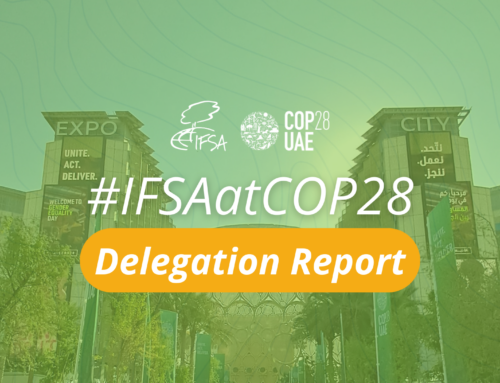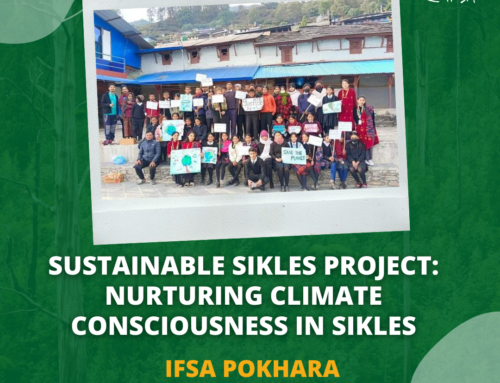Can we meet you? (previous study /research, current work, experience)
I am Andrew Heald, the Technical Director for Confor (Confederation of Forest Industries), a trade organisation representing over 1,000 companies working in the forestry sector in the UK. I started my career working as a forester in North Wales where I grew up, managing investment plantations of mainly Sitka Spruce. I have worked a lot with sustainable Forest Certification (both PEFC and FSC) and is leading a cross industry working group to simplify and improve the current system in the UK. I also works with WWF International helping deliver the New Generation Plantations Project, a multi-stakeholder platform investigating how plantations around the world can be better managed to deliver social and environmental benefits. I am a Member of the Institute of Chartered Foresters, and spends far too much time on twitter where you can find me @andyheald.
You’ve had over 20 years of experience, working in the UK, Finland, Uruguay and Ghana. Can you share with us your thoughts on forestry in these continents/countries?
Oftentimes, many of our challenges as foresters are due to poor communication, has someone understood what we have said, or have we understood what we have been told? It is very easy to jump to conclusions and make assumptions, sometimes the best option is to sit and listen, and talk to a wider range of people. I have been very lucky to work with a wide range of people and the most important thing I’ve learnt is to ask open questions and to really listen to the response.
When I worked as a forester in North Wales, I spent a lot of time talking to the farmers who were neighbours to my plantations. Often we needed to co-operate over issues like access or repairing fences; trying to understand their concerns and needs was really important to get the best outcome. It was very similar talking to working in Ghana, farmers there were also concerned about losing livestock in the plantations, about who is responsible for fences and who will repair the road after harvesting. The important thing to do is to listen and if you promise to fix the fence, that you keep that promise!
You were the official co-ordinator for the Economic Chamber at the just concluded FSC General Assembly in Vancouver. Can you highlight the major take homes from the GA?
As a coordinator my role was to help prepare and support the debate around the Motions, and if possible connect Motion proposers to other proposers with similar ideas. I also worked with the 2 other chamber coordinators to introduce proposers to FSC staff who could explain if their idea was included in the Global Strategic Plan.
I have been involved with FSC, as a forester, auditor and a Director of UKWAS for over 15 years and it was a real privilege to work with such a wide range of companies at the GA, from my ex-employer UPM to companies operating in the Congo Basin.
This was my 3rd GA, at the previous one in Seville, there were a lot of metaphors about oil tankers changing course, and that not only did we need to change course but FSC also needed to convert into several smaller vessels to aid maneuverability. Three years later, what has changed? There were some key positives, especially the renewed interest and support for small-holders. A lot of the FSC challenges for smallholders are universal for all forest owners, so solving them should result in significant overall positive change. The pesticide policy is also now more pragmatic and workable; and some of the ideas discussed in FSC 2.0 sessions were very exciting.
There were also some challenges; the FSC family is still arguing about Controlled Wood and Intact Forest Landscapes (IFL). Although I think this General Assembly actually helped reach, if not a solution then at least an agreed direction of travel for these key issues. I am concerned that there seems to be a general fatigue particularly around public consultation, and that some organisations (from all chambers) are concerned about the “value proposition”.
The General Assembly is democracy red in tooth and claw; some great ideas are rejected and some less good ones are supported. Some members want to see FSC as the platinum standard and to drive forward protection of intact forest landscapes, other members that FSC should remain as a market driven mechanism to support the sustainable management of forest products.
On the Friday afternoon of the GA, stood in front of a room of 600 people who had spent a week in largely windowless meeting rooms, I was convinced that the passion and determination is still alive to develop and support better forest management. Our challenge is how to enable those 600 people to work together, to listen better and most importantly to all trust each other a little more.
You gave a talk on Forestry in UK at UBC Faculty of forestry. Can you give a summary of the talk?
It was a great opportunity to speak to the Faculty, my talk was mainly about UK forestry and trying to draw some comparisons with other areas where I have worked. My work in the UK is for an industry trade association, Confor and we have produced 2 videos, one of which I showed to the faculty – https://www.youtube.com/watch?v=XM5AA-6DTlA and also http://www.confor.org.uk/our-story/animating-forestry/
The UK is the 2nd largest net importer of timber in the world, and has some of the lowest forest cover in Europe at only 12%. Often we see forestry or timber as domestic issues, but see deforestation and pressure on the world’s forests as a separate international issue. I think it is important to have a greater understanding of how many of these issues are interconnected. The UK has a long history of telling other people how to manage their forests and I wanted to quickly try to communicate how in the UK we are also trying to manage our own resources better.
What will be your advice for forestry students and young forestry professionals across the world?
Forestry is a great career, and has enabled me to work all over the world. My advice would be to say “Yes” a lot and take every opportunity to go on courses, attend conferences or participate in exchanges. There are lots of interesting opportunities out there, but they don’t always look like opportunities. At one point in my career I was asked if I would move to Tasmania for at least a year, there weren’t many details but they need an answer quickly. Unfortunately, that job never happened, but I was then asked if I would got to Uruguay for 4 months and after that to West Africa. If I hadn’t said “Yes” to the Tasmania opportunity, I would probably not be talking to you now. The other key issue is using social media in all its forms – it is a great way to meet people and learn from other foresters from all over the world. It is also a vital way to understand what the concerns from stakeholders are, it is a very simple way to get a “temperature check” on issues like certification, pesticides or deforestation.
About the writer :Samuel Adeyanju is a graduate student in the faculty of Forestry at the University of British Columbia (UBC), Canada. He was a member of International Forestry Student Association delegation at the UNFCCC COP23 in Bonn. His research interests revolve around community forestry, forest certification systems, forest policy and governance.
Linkedin: https://www.linkedin.com/in/samuel-adeyanju-b5976b74 ]]>



